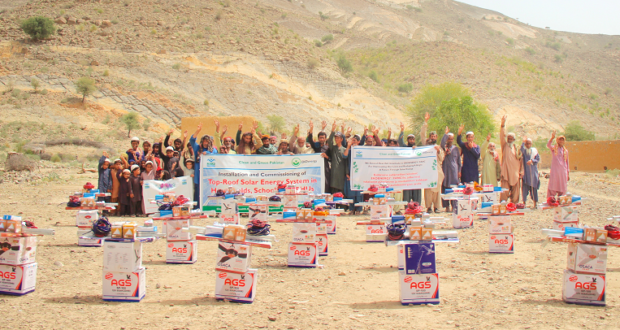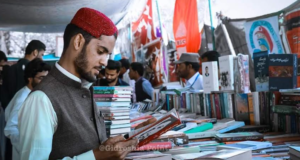By: Mohammad Waris Shaheen
Balochistan, Pakistan, has long grappled with multifaceted challenges, including educational shortcomings, an outdated tribal system, scattered populations, and limited economic opportunities. This has resulted in over 43% of the land being home to a population struggling with poverty. Recognizing the difficulties faced by the government in addressing these issues single-handedly, non-governmental organizations (NGOs) have stepped in to intervene.
In countless rural areas of Balochistan, the absence of electricity plunges communities into darkness after sunset. The unavailability of electricity and lack of access to solar energy exacerbates this issue, leading residents to resort to unsustainable practices such as cutting down trees for fuel. Traditional sources like wood, dung, kerosene oil, and candles are employed for lighting, cooking, and heating, contributing to deforestation and impacting the climate in hot and drought-prone areas. This reliance on primitive fuel sources also has severe health consequences, with respiratory and ocular problems prevalent among inhabitants. During the daytime, women engage in various activities, but after sunset, their opportunities for income generation, such as embroidery and tailoring, are curtailed. Children are unable to study at night, and the community is hindered from organizing social events due to the lack of adequate lighting. Additionally, the warmth of the weather disrupts proper sleep, further affecting the overall well-being of the community. The repercussions extend to essential services like health centers and schools, which remain nonfunctional after dark due to the absence of reliable lighting. This compromises the ability of health centers to respond to emergencies in far-flung areas during nighttime. Furthermore, the depletion of underground water, rampant deforestation without reforestation, and unchecked pollution from the burning of traditional fuels compound the environmental challenges. The critical nature of these issues becomes more apparent at the rural level, where poverty tightly grips communities, particularly affecting vulnerable groups such as children, women and minorities.
Recognizing the severity of these issues, a non-profit organization, referred to as “Health And Rural Development (HARD) Balochistan,” devised a comprehensive plan to address the root causes. Despite facing significant challenges and limited resources, HARD team leveraged its understanding of the area, the nature of problems, and its established rapport with the community to formulate a strategic approach. The focus was on improving general health, particularly for girls and women who faced numerous health hazards from hazardous pesticides used in crop fields and exposure to kerosene oil, dung and wood smoke.
HARD Balochistan initiated a project proposal titled “Harnessing Solar Energy To Tackle Climate Change, Empower Communities And Conntribute in Achieving SDGs2030 in Tehsil Aranji Khuzdar, Balochistan, Pakistan”. The proposal secured funding from EKOenergy Ecolabel – Finnish Association for Nature Conservation a move that marked the beginning of a transformative initiative.
The project successfully implemented with in the duration of six months covering 100 households, five schools and five Basic Health Centers in five hard-to-reach villages of Tehsil Aranji District Khuzdar. Awareness became a cornerstone of the project implementation, with a keen understanding of the social limitations, norms, and values of the target communities. HARD team engaged in continuous dialogue with the community, considering their suggestions and ensuring ownership of the efforts. The marginalized sections of society were the primary focus throughout the process, with both short-term and long-term targets delineated.
The solar project yielded tangible benefits, transforming the lives of people, wildlife, and the ecosystem. School children could now study with the aid of solar-powered fans during hot summer days, and women engaged in economic activities beyond sunset. Social gatherings, discussions, and events flourished at night, fostering community engagement. The project significantly improved air quality, mitigated climate change, and halted the economic decline of the region.
As part of the initiative, basic training was provided to 110 individuals on maintenance and operation of the solar systems. Additionally, 25 young men underwent a month-long training program on “Green Job Skills,” equipping them with the knowledge to install, operate, and maintain solar systems. These individuals were provided with tool kits to either start small businesses or pursue self-employment, contributing to livelihood improvement and the adoption of clean solar energy.
The successful implementation of the project, carried out with periodic analysis and slight modifications, showcased the potential for addressing complex rural challenges with limited resources and time. The positive outcomes garnered appreciation from the community, stakeholders, and political representatives who acknowledged EKOenergy Ecolabel and their supporters for funding a project that protected the environment, illuminated lives, and combated poverty through renewable, clean, and green solar energy systems. The initiative by HARD Balochistan demonstrated that timely identification of relevant facts can lead to impactful solutions for the intricate problems faced by rural Balochistan.
Published in The Balochistan Point on November 28, 2023
 Balochistan Point Voice of Nation
Balochistan Point Voice of Nation




